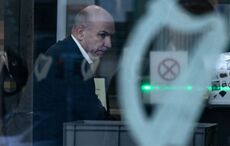Read More: David Drumm photo gallery
David Drumm first learned about the Anglo tapes when he logged on to the Irish Independent website early Monday morning in New York.
"I knew they were bad, bad, bad," he told IrishCentral on Friday.
He said he was aware such bank conversations were recorded and he especially wants to hear the similar conversations that were going on at that intense time between the other banks and the Central Bank of Ireland and the Financial Regulator.
It was a panicked time in the fall of 2008 as he relates it, when the entire foundation of the Irish economy seemed on the verge of crumbling. Threats and bluster and frustration were everywhere.
He sees a silver lining from his own perspective, that the focus will shift from the tapes to the events surrounding the disastrous government guarantee -- which he is adamant must be explained if people are to learn the whole truth about that period.
He sees the selective leaking of the tapes and the aftermath as a clear attempt to link Anglo to the creation of that guarantee. But he insists that the Anglo liquidity issue discussed on the tapes, and the guarantee decision made when Anglo was not present, are two very separate issues.
He is back in the limelight after a relatively quiet period and accepts his role as the villain but believes there is a compelling alternative narrative where everyone involved in the disastrous sequence of events at the time will receive the same scrutiny as he and his bank already have. That, he says, is what keeps him going.
(The Anglo Tapes were released last week by the Irish Independent , showing conversations between Anglo bankers including then CEO David Drumm discussing the massive banking crisis in September 2008 as it reached its zenith and Anglo was trying to stay afloat)
Do you regret the language used on the tapes?
I accept that the tone and language used in the tapes is inappropriate and I fully understand why the excerpts published have offended many people. Listening to a recording made almost five years ago at a highly stressful and volatile uncertain time is both embarrassing and a shocking reminder of how much pressure my colleagues and I were under at that time.
However, there is no excuse for the terrible language or the frivolous tone and I sincerely regret the offence it has caused. I cannot change this now but I can apologise to those who had to listen to it and who were understandably so offended by it.
But don't the tapes accurately reflect what was going on within Anglo at the time?
The selected excerpts from tapes beg more questions than they answer. They promote and suggest an incorrect interpretation about how and why the government issued a blanket guarantee in September 2008.
As this is at the very root of the current economic problems in Ireland it is not credible that these tapes somehow explain, or part explain, the government’s reasoning for issuing the guarantee.
One has nothing to do with the other. And yet the tapes are being represented by sections of the Irish media as 'proof' that some form of misrepresentation took place on behalf of Anglo Irish Bank.
The facts do not in any way support this. The bank guarantee was issued on the night of September 29, 2008, following a meeting between the government, its officials and the chief executives and chairmen of Bank of Ireland and Allied Irish Bank who were present on the night.
So Anglo was not present?
Anglo Irish Bank was not represented and was unaware of the meeting in Government Buildings and found out about the guarantee the following morning at the same time the public was made aware through media reports. This has never been fully explained to the Irish public.
At no time did Anglo Irish Bank request the Central Bank or the Financial Regulator to ask the government to issue a blanket bank guarantee of all Irish banks' liabilities. Anglo's request was for a secured (on its loan book) loan facility of e7bn.
Anglo first became aware of the decision to issue the guarantee at the same time it was announced by the government. The bank was elated with the news because it was believed that the bank had been saved.
However, many in the bank were stunned that the government would take what some described at the time as the 'nuclear option' of guaranteeing all of the banks' liabilities instead of just protecting depositors. In order to survive the crisis, the bank would have been very grateful if they had protected depositors' money and provided the bank (and the other banks) with liquidity support to get the bank through the crisis.
So you believe the government and other banks present have much more to answer for on the guarantee than Anglo?
The public has never been told exactly what happened on the night of September 28, 2008. The government's decision to issue the guarantee covering all liabilities and not just depositors, is the root cause of the liabilities that have been placed upon the shoulders of Irish taxpayers, by a decision of the government in secret caucus.
Neither I nor my colleagues nor anyone in the bank were aware of the decision until it became public yet it has been portrayed in the public domain as something promoted by, driven by or demanded by Anglo Irish Bank. This is simply untrue and the facts support this position.
Questions have not been asked as to who benefited from the blanket guarantee, since it was most certainly not in the best interests of the State, and what advice the government received on the night and from whom that advice came. Again I would welcome this disclosure to finally put an end to the accepted untruth that Anglo Irish Bank sought a guarantee.
So what is your belief about why the tapes were released now?
Everyone, Anglo and its officers and directors have been investigated by the ODCE, the Gardai and the Central Bank, as well as the internal investigations that were carried on in the bank itself after it entered public ownership.
The authorities have had all recordings of telephone conversations in the bank at the relevant time in their possession for over four years, with no allegations of wrongdoing coming out of the tapes and yet selected excerpts are only coming to the attention of the public now. There has been no explanation as to who leaked the tapes to a crime correspondent.
There is also no explanation as to why all recordings are not being made available to the public. For example, the taped calls between senior managers (including myself) at Anglo Irish Bank and the Financial Regulator, Central Bank and the Department of Finance would shed light on the context of discussions at the time yet they have either not been leaked or have not being published.
So you believe the excerpts were carefully chosen?
If the public are to be offered selected excerpts which tell a one-sided story of conversations in the banks during the crisis, to suit an agenda set by an unknown special interest, then they should be afforded the opportunity to hear all of them, from all of the banks, along with those of government officials, the Regulator and the Central Bank. Anything less just prolongs the proliferation of inaccurate accounts of the circumstances surrounding the Governments decision in September 2008.
I believe that the Irish public will see a very different picture when the full story is told, having being denied a full account of the precise circumstances for so long.
People have a hard time believing that you were not playing rope-a-dope with the regulator and government in September 2008,
Anglo requested a secured loan facility (the 'Promissory Note') from the Central Bank, to help the bank deal with its liquidity issues following the collapse of Lehman Brothers and the severe dislocation experienced by financial markets at the time.
The request for liquidity support was based on detailed cash flow forecasts going out over a number of weeks, which were updated every day. These updates were discussed with the Central Bank at least once a day during the crisis in September.
The cash flow forecasts estimated the bank's requirement for funding would peak at circa e7 billion, assuming the financial markets crisis returned to normal at some point in the near future.
But doesn't this tape extract prove that Anglo knew the final bill would be much higher?
The excerpts from the tapes appear to suggest that this figure was arbitrary but this is inaccurate and supported by the submissions to the Central Bank at that time. There was no attempt whatsoever to conceal the extent of the cash flow problems from the Central Bank and the Regulator. On the contrary they were all too intimately aware of just how critical things were in Anglo Irish Bank along with all other Irish banks.
There is no reasons why all presentations and documents, and daily cash flow forecasts, which Anglo submitted to the Central Bank in September 2008 in support of the bank's loan request cannot be made available to the public immediately to inform this issue and to satisfy the public's right to be accurately informed. They would prove that there was absolutely no attempt or desire to mislead anyone about the extent of the bank's problems.
Did you yourself not threaten to shut down Anglo with your quote about handing over the keys to the Central Bank?
I accept, and I sincerely regret that much of the inappropriate and inexcusable language used in the excerpts published gave an impression of a provocative and bullish approach to the dealings with the Central Bank. But in fact this was little more than an expression of the bank's exasperation at the slowness and lack of clarity in the responses from the Central Bank, as substantial and worrying amounts of deposits continued to exit the bank on a hourly basis.
But surely you must have known Anglo was about to go bust?
The increasing losses in Anglo Irish Bank's loan portfolio did not take effect until the effects of the property market collapse and the contraction in the general economy started to be felt in the first half of 2009. This is a matter of record and a matter that has been sworn before the courts.
IBRC, as successor to Anglo Irish Bank, recently provided sworn testimony in the High Court that the bank was solvent in 2009. This begs the question: either the sworn testimony is inaccurate or the sworn testimony was correct and the bank was also solvent in 2008. There has been no attempt to clarify this issue.
The 2008 audited accounts for the bank were signed off by government-appointed directors in February 2009, showing the bank to be solvent, and reporting a profit of over €800m for the 2008 financial year. This again appears inconsistent with the public debate and begs the question: did the government-appointed directors issue inaccurate or accurate accounts?
The Anglo loan book was reviewed in detail in late 2008, firstly by a committee of the non-executive directors, led by Donal O'Connor, and subsequently by PWC, appointed by the Central Bank. The bank's bad debt provisions were deemed to be sufficient after all reviews. Otherwise, presumably, the 2008 accounts would have been amended if it was concluded at the time that additional provisions were necessary. Again, there exists irrefutable evidence, which will shed light on this issue, contained in the relevant non-executives' report and a Price Waterhouse Coopers report. There is no reason why these reports should not be made available to the public .
So you are saying Anglo was solvent at the time it asked for liquidity assistance?
The bank's solvency was not an issue at this time. Rather there was extreme strain on liquidity -- ie, the bank was quickly running out of cash due to massive withdrawals mostly by international corporates and fund managers. As reflected in the tapes, the bank was actually losing a billion a day in the second half of September 2008.
While I am aware there is much debate on the issues of 'solvency' as opposed to 'liquidity' during this period, I can only deal with what was happening at that precise time, and these issues were at that time entirely separate.
The increasing losses in Anglo Irish Bank's loan portfolio did not take effect until the effects of the property market collapse and the contraction in the general economy started to be felt in the first half of 2009. This is a matter of record and a matter that has been sworn before the courts.
You believe there should be an inquiry into the bank guarantee which you say is at the root of all of Ireland's current problems?
There exists a vast portfolio of documents, meeting notes and correspondence between the Financial Regulator, the Central Bank, the Department of Finance, the Department of the Taoiseach, European officials and politicians, Allied Irish Bank, Bank of Ireland, Irish Nationwide Building Society and Anglo Irish Bank in September 2008 and leading up to the issuance of the blanket guarantee on September 29, 2008. If this was made public this misrepresentation and misleading of the Irish public could finally come to an end.




Comments